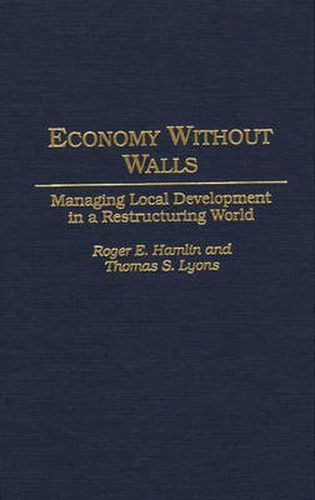Readings Newsletter
Become a Readings Member to make your shopping experience even easier.
Sign in or sign up for free!
You’re not far away from qualifying for FREE standard shipping within Australia
You’ve qualified for FREE standard shipping within Australia
The cart is loading…






Recent years have witnessed a revolution in the way economies work. The world has moved away from centralized governments and economies, toward decentralized governments and market-driven economies. A pragmatic, non-ideological approach to mixed economic systems is becoming the order of the day, blurring the lines between public and private, and referred to here as the economy without walls. The purpose of Hamlin and Lyons’ new work is to synthesize an understanding of the economy without walls, distill the implications of this economy for local communities, and apply knowledge of those implications to guiding communities’ development. The book assumes that the use of intersectoral partnerships is an important part of any urban or regional development strategy. It systematically describes such partnerships, including the philosophical foundations of this approach and the financial and non-financial activities used to implement it. The work then discusses trends in the theory and practice of local community management that result from this economic restructuring. The implications of the economy without walls cannot be ignored if urban planners and related professionals are to be effective in the new worldwide environment. This book will be a must-read for scholars, students, and practitioners in urban planning, economic development, and public administration.
$9.00 standard shipping within Australia
FREE standard shipping within Australia for orders over $100.00
Express & International shipping calculated at checkout
Recent years have witnessed a revolution in the way economies work. The world has moved away from centralized governments and economies, toward decentralized governments and market-driven economies. A pragmatic, non-ideological approach to mixed economic systems is becoming the order of the day, blurring the lines between public and private, and referred to here as the economy without walls. The purpose of Hamlin and Lyons’ new work is to synthesize an understanding of the economy without walls, distill the implications of this economy for local communities, and apply knowledge of those implications to guiding communities’ development. The book assumes that the use of intersectoral partnerships is an important part of any urban or regional development strategy. It systematically describes such partnerships, including the philosophical foundations of this approach and the financial and non-financial activities used to implement it. The work then discusses trends in the theory and practice of local community management that result from this economic restructuring. The implications of the economy without walls cannot be ignored if urban planners and related professionals are to be effective in the new worldwide environment. This book will be a must-read for scholars, students, and practitioners in urban planning, economic development, and public administration.